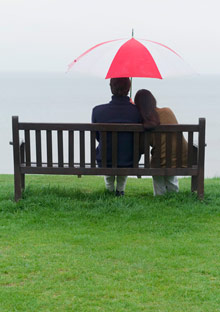Understanding Desire

© 2008 Jupiterimages Corporation
It's joy, it's misery, it's an ache that you miss when it's gone—what is it about desire that has such a hold on us? Patricia Stacey takes a tutorial on a subject as old, knotty, delicious, and confusing as love itself—though love has nothing to do with it—and discovers the real laws of attraction.
Late spring. I was in my first year of college. Big Sur and Monterey Bay shimmered through a ferny redwood foreground as my boyfriend and I sat in my college library social room watching a play. Daniel, my tall and beautiful admirer, leaned in close beside me, laughing and waiting for me to laugh with him. I lifted Daniel's long, expressive fingers off my leg, tilted my head away just so slightly, and crossed my legs into the aisle. I wished we could be like the other couples in the room, fingers entwined, occasionally looking at each other with shared mirth and recognition, but I couldn't do it. Especially not with a professor sitting behind us—watching our every move. And especially not this particular professor. Bald, intense, white-mustached, and as old as my grandfather, the man I'll call Professor Bellagio taught psychology. He was known for his research on the subject of desire. Charles Bellagio was a legend, a hero. I often saw him strolling with his wife, a retired physicist, a silver-haired beauty. One day I mustered the confidence to visit Bellagio in his office and asked if he would sponsor me in an independent study.
"What do you want to research?" he asked. I suggested something rather dull.
"I have a better idea," Bellagio said. "How about desire? You know it's my field. Are you interested in the topic?"
Interested? The truth was I'd been fascinated by the subject for years. I nodded dumbly.
"We'll meet next quarter, once a week," he said. "Keep a journal until then and bring it the first day. I want you to define desire for me."
Bellagio was sitting in a corner of his large office in an overstuffed chair, smoking a pipe, when I found him that first official day of our independent study. He motioned for me to sit down directly in front of him. He crossed his arms and sat there staring at me. "What is desire?" he finally asked. Shy and panicked, I didn't answer right away. He pulled my journal from my lap and read the only sentence I had written there: "Desire is a joke created by a willful and perverse minor deity with a chip on his shoulder."
Bellagio flattened out the hairs on his snowy mustache and studied me. Then he said, "Were you afraid to be serious?"
"It's not that—it's just that I am not sure I'm going to be very good at figuring out what desire is. My relationships always end disastrously."
"We'll have to go to the experts," said Bellagio quickly. His speech was like lightning, his mind firing fast; his body was slower, an echo of that light. There were rumors that he'd had a stroke. He stood and, walking with a slight limp, made his way to the book-lined wall of his office and plucked out a volume.
"The Golden Bowl?" I asked. "This is fiction. I was expecting something by a psychologist."
Bellagio shook his head. "Compared with this writer, most psychologists know nothing about love." He sent me home with a stack of fiction and one philosophy book: Lolita. Remembrance of Things Past. Of Human Bondage. Being and Nothingness.
Each week Bellagio assailed me with questions inspired by the reading. At first I struggled.
"When we desire someone, what exactly are we desiring?"
"Someone else who desires us?"
"Yes...that's part of it. So what then are you desiring?"
As a reminder, always consult your doctor for medical advice and treatment before starting any program.



